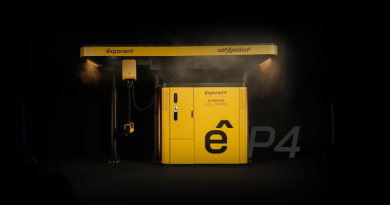Gulf Oil’s EV transition | Chat with Manish Gangwal

Gulf Oil is gearing up to transition from a traditional lubricant company to a frontrunner in the EV infrastructure space. In this conversation with Mr Manish Gangwal – CFO of Gulf Oil Lubricants India Ltd, we delve into this strategic shift and discuss the initiatives and investments the company is undertaking.
Could you briefly discuss Gulf Oil’s focus on electric vehicles, particularly the EV charging segment?
Gulf is traditionally a lubricant manufacturing company and a brand with over 100 years of legacy. We are present in more than 100 countries and are well-recognized in the lubricant space, particularly in the oil and energy sector. With the world now transitioning toward the electrification of mobility, we, as a company, took a step back to strategise our role in this evolving journey of sustainable mobility.
During this process, we engaged in several discussions around the EV ecosystem to evaluate Gulf’s strengths and identify customer needs.
- As a brand, Gulf is already well-established and trusted by automotive consumers. Today’s ICE vehicle buyer might shift to an EV tomorrow, and it became crucial for us to remain connected and relevant to that consumer throughout their journey.
- Another significant strength for us is our longstanding relationships with OEMs. We currently work with over 15 automotive OEMs and over 40 OEMs across the industrial and automotive component sectors. Whether it’s new startup OEMs in the EV space or incumbent ICE manufacturers launching EV models, we saw an opportunity to leverage our excellent OEM relationships to continue serving these partners.
- Our Pan-India distribution network presents a strong foundation with over 80,000 touchpoints and over 10,000 branded garages, such as Gulf Car Stops and Gulf Bike Stops. This network could be utilised to support our role in the EV value chain.
With all these factors in mind, we decided to explore opportunities in the EV ecosystem, starting with EV charger manufacturing. This led to our initial investments in this area and set the foundation for our journey into the EV space.
Our ultimate focus remains on staying relevant in the evolving EV ecosystem while continuing to strengthen our core lubricant business, which remains our primary revenue driver. India’s vehicle penetration per capita is still low compared to Europe or even South Asia. Once a country’s GDP per capita crosses the $2,500 threshold, vehicle demand tends to grow exponentially for the next 5 to 10 years. Therefore, we are confident that our ICE and lubricant business will continue to grow at the same rate, if not faster, for the next decade. At the same time, the emerging EV segment presents an additional opportunity for us to address and grow alongside.
Could you walk me through the key areas Gulf Oil focuses on within EV charging?
We began by focusing on charger manufacturers. This led to our decision to invest in companies specialising in charger manufacturing.
- Our first investment was in Indra Technology, a UK-based company. Their primary focus is on home chargers for cars, specifically 7.2 kW AC chargers. With over 20,000 installations in the UK, they hold a respectable market share and have a proven technology. Indra is an R&D-driven company with features like V2G (Vehicle-to-Grid) and V2X (Vehicle-to-Everything) technology.
- More recently, we acquired majority stake in Tirex Tech Transmission, an Ahmedabad-based manufacturer of DC fast chargers. They currently hold an 8-10% market share in India’s fast charger segment, with over 1,500 successful installations demonstrating their product reliability.
With the above two acquisitions, we offer a comprehensive range of AC and DC chargers, with capacities spanning from 3.3 kW to 240 kW. Leveraging Gulf’s strengths, we are committed to helping these companies evolve into sustainable business models over the next 5 to 7 years.
- In addition, we also acquired a 26% stake in ElectriFi, a company specialising in charging software. Running the chargers and integrating the EV ecosystem requires robust software as its backbone. This software facilitates the connection between the charger, vehicle, and battery, while enabling users to locate and pay for the chargers. Their front-end app is among the top downloaded apps for locating chargers.
We have invested ₹150 crore across these three opportunities.
You’re looking to expand your EV portfolio further. Is this expansion primarily through acquisitions, or do you plan to build your in-house capabilities to establish a presence in some areas?
Gulf is a company with a long legacy of R&D and technology innovation. Going back over 100 years, Gulf pioneered the first-ever drive-in petrol station in the world, and the first offshore drilling platform was a Gulf drilling platform. We’ve carried this legacy forward, especially in the lubricant space, launching the first long-drain lubricant product for the commercial vehicle segment.
We aim to continue this tradition of innovation in our new EV journey. Significant efforts are underway, including investments in R&D. Our company is continuously focused on developing new products and enhancing the performance of current chargers. We’re also working on localising some components, as the industry still relies on imports for many key parts. These initiatives are being driven across all three entities in which we have invested.
We understand you’re actively seeking acquisitions of charge point operators and companies involved in grid integration technologies. What type of startups are you considering for evaluation?
We are always on the lookout for opportunities in the EV value chain, but we’re not fixated on which company to pursue. This is an evolving field. Recently, battery swapping emerged as a significant opportunity to reduce the upfront cost of EVs. However, many OEMs have not fully embraced the concept due to unclear guidelines. If this concept revives and presents opportunities for Gulf to use its distribution network to offer battery swapping, we would consider those kinds of companies.
Simultaneously, we are also exploring charge point operator (CPO) opportunities, particularly in the bus segment, where utilisation levels have reached a sufficient level. We are open to these opportunities and looking into mobility as a service.
The key factors we consider are: First, the opportunity must align with our strengths—our brand, distribution network, and OEM relationships. Second, it needs to be a business model that isn’t a long-term cash burn. We don’t want to enter areas requiring sustained heavy investment with uncertain returns.
Can you provide an overview of the investments Gulf plans to make in India in the coming years?
We have invested ₹150 crore across the three companies mentioned earlier. Our primary objective is to meet the increasing requirements of these ventures. We will also explore the right opportunities to further consolidate our stake in these companies.
We are a cash-generating company through our lubricant business, and we aim to leverage that for emerging opportunities. We haven’t earmarked a specific amount for this, but funding will not be an issue if the right opportunities arise.
EVs will create a new market and a new classification of fluids. What kind of products does Gulf Oil plan to introduce specifically for electric vehicles?
Yes, absolutely. This is a natural extension of our lubricant product portfolio. Electric vehicles require specific fluids to function efficiently. Some of these include transmission oils, brake fluids, coolants, and greases. The transmission fluids, in particular, will help keep the battery pack and other components, like powertrains, cool and operational. These requirements differ from those of ICE vehicles, so the solutions we provide will be tailored accordingly.
We have already launched EV-specific products and are working with 8 to 10 EV OEMs. Our fluids are already being used in their vehicles and pre-filled at the factory. This represents a factory-fill opportunity, as the replacement market has yet to gain significant demand. However, as these vehicles remain on the road for 3-4 years, the replacement market will start to develop.
Gulf Oil operates in over 100 countries, including regions where vehicle electrification is already more advanced than in India. Our global portfolio already includes a full range of products, and we will adapt them to meet local needs in India as needed.
Also read: Gulf Oil acquires majority stake in DC charger maker Tirex chargers – Chat with CEO Arth Patel
Subscribe today for free and stay on top of latest developments in EV domain.






